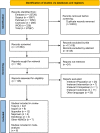Nonsteroidal anti-inflammatory drugs in acute viral respiratory tract infections: An updated systematic review
- PMID: 35218614
- PMCID: PMC8881905
- DOI: 10.1002/prp2.925
Nonsteroidal anti-inflammatory drugs in acute viral respiratory tract infections: An updated systematic review
Abstract
In this systematic review, we aimed to assess the efficacy and safety of nonsteroidal anti-inflammatory drugs (NSAIDs) in treating respiratory tract infections in adults and children. PubMed, Scopus, Web of Science, Cochrane, and Embase databases were searched. A total of 34 randomized clinical trials were included in this systematic review. We assessed the risk of bias of all included studies using the Cochrane tool for risk of bias assessment. The evidence on ibuprofen, naproxen, aspirin, diclofenac, and other NSAIDs were rated for degree of uncertainty for each of the study outcomes and summarized using the grading of recommendations assessment, development, and evaluation (GRADE) approach. Our findings suggest that high-quality evidence supports the use of NSAIDs to reduce fever in both adults and children. However, the evidence was uncertain for the use of NSAIDs to reduce cough. Most studies showed that NSAIDs significantly relieved sore throat. The evidence for mortality and oxygenation is limited. Regarding the adverse events, gastrointestinal discomfort was more frequently reported in children. For adults, our overall certainty in effect estimates was low and the increase in gastrointestinal adverse events was not clinically significant. In conclusion, NSAIDs seem to be beneficial in the outpatient management of fever and sore throat in adults and children. Although the evidence does not support their use to decrease mortality nor improve oxygenation in inpatient settings, the use of NSAIDs did not increase the rate of death or the need for ventilation in patients with respiratory tract infections. Further studies with a robust methodology and larger sample sizes are recommended.
Keywords: acute respiratory distress syndrome; acute respiratory tract infections; coronavirus disease 2019; nonsteroidal anti-inflammatory drugs; systematic review.
© 2022 The Authors. Pharmacology Research & Perspectives published by British Pharmacological Society and American Society for Pharmacology and Experimental Therapeutics and John Wiley & Sons Ltd.
Conflict of interest statement
The authors declare no conflict of interest.
Figures

References
-
- van Doorn HR, Yu H. Viral respiratory infections. Hunter's tropical medicine and emerging. Infect Dis. 2020;284–288. doi: 10.1016/B978-0-323-55512-8.00033-8 - DOI
-
- Skehin K, Thompson A, Moriarty P. Is use of ibuprofen safe in children with signs and symptoms of lower respiratory tract infection? Arch Dis Child. 2020;105(4):408. - PubMed
Publication types
MeSH terms
Substances
LinkOut - more resources
Full Text Sources
Medical

